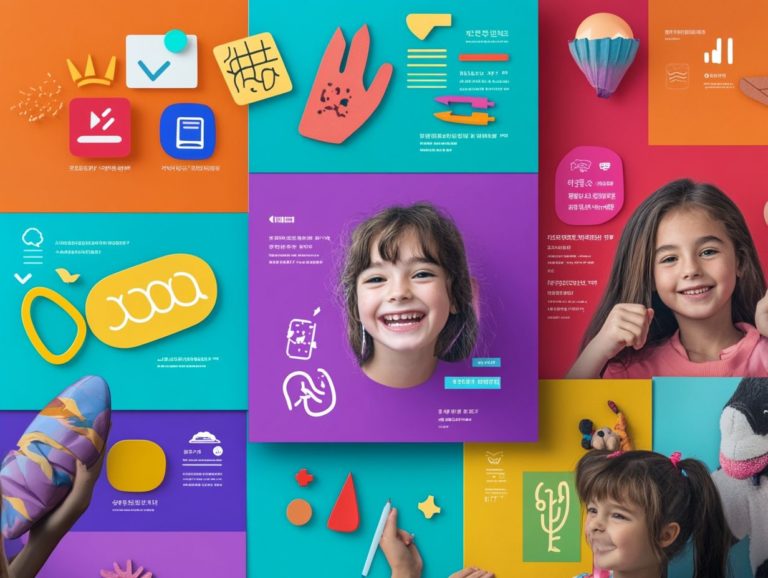5 Language Learning Tools for Self-Studiers
In today s interconnected world, learning a new language can unlock a multitude of opportunities. With an abundance of tools at your disposal, you might wonder where to start.
This article delves into five popular language learning platforms Duolingo, Rosetta Stone, Babbel, Memrise, and Busuu each tailored for self-directed learners like you. It will help you identify the right tool for your specific needs, highlight essential features to consider, and provide valuable tips to keep you motivated while steering clear of common pitfalls.
Whether you re just starting out or seeking to polish your existing skills, this guide will supercharge your language learning journey with confidence and effectiveness. Start your journey today and unlock endless opportunities with these powerful tools!
Contents
- Key Takeaways:
- 1. Duolingo
- 2. Rosetta Stone
- 3. Babbel
- 4. Memrise
- 5. Busuu
- How to Choose the Right Language Learning Tool for You?
- What Are the Key Features to Look for in a Language Learning Tool?
- What Are the Pros and Cons of Self-Studying a Language?
- How to Stay Motivated While Self-Studying a Language?
- What Are the Common Mistakes to Avoid When Self-Studying a Language?
- How Can One Supplement Their Language Learning with Other Resources?
- Frequently Asked Questions
Key Takeaways:

Duolingo offers a free and interactive platform with a variety of languages to choose from.
Rosetta Stone provides a comprehensive immersion-style learning experience for a more natural approach.
Babbel offers short and engaging lessons designed by language experts for targeted learning.
1. Duolingo
Duolingo has become a standout choice among mobile apps for language learning. It offers interactive exercises that elevate your vocabulary, pronunciation, and overall language skills through fun, game-like lessons that keep you motivated and invested.
This innovative tool adapts to your individual learning style, creating a fun and effective environment for mastering foreign languages. With gamification elements like rewards, challenges, and streaks, you’ll find yourself immersed in a playful competition that encourages consistent practice.
Unique features such as spaced repetition reviewing words over time to help you remember them better ensure that the trickiest vocabulary truly sticks, allowing you to reinforce your knowledge over time. The app also encourages users to provide pronunciations, fostering a vibrant community and showcasing diverse accents.
Through a wide array of exercises listening, speaking, and writing tasks the platform not only supports vocabulary acquisition but also transforms language learning into an enjoyable experience.
2. Rosetta Stone
Rosetta Stone stands out with its immersive program that prioritizes cultural learning and real-life conversation. You’ll find audio lessons designed to elevate your speaking and comprehension skills effectively.
The program utilizes a distinctive methodology that focuses on translations that fit the situation, ensuring you grasp the nuances and practical applications of the language in everyday situations.
With advanced pronunciation tools at your fingertips, you ll receive instant feedback on your speaking accuracy, which boosts your confidence as you progress. This mix of real-life situations and quick feedback works really well in teaching various foreign languages.
It equips you not just with vocabulary but also with the cultural insights necessary to communicate effortlessly in diverse settings.
3. Babbel
Babbel has truly carved out a distinct place in the language learning arena with its meticulously structured approach. It offers vocabulary tips and tutorial lessons tailored to your specific needs, making it an exceptional choice for anyone genuinely committed to achieving fluency.
What distinguishes Babbel is its innovative use of speech recognition technology, enabling you to practice pronunciation and receive instant feedback, significantly enhancing your speaking abilities.
Babbel provides personalized learning paths designed to accommodate various skill levels, ensuring that both beginners and advanced learners can progress at their own pace.
This tailored approach not only keeps you engaged but also helps build your confidence as you navigate realistic conversations, effectively reinforcing your language skills. The interactive guide becomes a powerful ally in your journey toward fluency.
Ready to dive in? Choose a platform and start your language journey now!
4. Memrise

Memrise is your go-to dynamic flashcard app, carefully designed to elevate your vocabulary building through innovative learning methods. It seamlessly combines a method that helps you remember words better over time with engaging video content from native speakers, ensuring you internalize new languages with remarkable efficiency.
This platform stands out because it focuses on real content, allowing you to interact with vocabulary that resonates with everyday situations. You’ll discover an extensive library of user-generated lessons that offer diverse perspectives and applications of the language, enriching your learning experience.
This unique approach enhances memory retention through active recall and encourages practical language use. It transforms your learning journey into something not just efficient, but genuinely enjoyable. These features help foster a deeper connection to the language, revolutionizing how you communicate and engage with others.
5. Busuu
Busuu offers you a unique platform for language learning, blending language exchange and communication tools. Here, you can practice with native speakers while enjoying interactive subtitles in your lessons.
This innovative approach boosts your vocabulary and grammar skills while immersing you in the cultural nuances of the language you re mastering. Dive into real conversations that mirror everyday scenarios, making your language acquisition all the more relevant and practical.
The community aspect of Busuu enhances your experience by fostering valuable interactions. You can receive constructive feedback and support from fellow learners around the globe, nurturing motivation and accountability. Share experiences and insights that deepen your understanding of the language and its cultural context.
How to Choose the Right Language Learning Tool for You?
Choosing the right language learning tool hinges on several factors, including your personal learning style, goals, and the specific language skills you want to develop. Exploring 5 online language courses you should try can significantly transform your language acquisition journey.
By assessing your individual learning preferences, you can find resources that resonate with your educational aspirations. For example, you might flourish in a visually rich environment filled with vocabulary-building games, while others may enjoy interactive exercises that prioritize conversational practice.
Engagement is paramount; it keeps your motivation alive and creates an inviting atmosphere for absorbing new knowledge. By scrutinizing tools that emphasize these crucial elements, you can tailor your approach to meet your unique needs and propel yourself toward linguistic proficiency. Start your language journey today!
What Are the Key Features to Look for in a Language Learning Tool?
When evaluating a language learning tool, look for unique language learning techniques that make learning engaging, as well as pronunciation tools that use audio lessons for a more immersive experience. A comprehensive dictionary for quick reference can also be invaluable.
A user-friendly interface is crucial for enhancing your overall experience, allowing you to navigate effortlessly between lessons and resources. Adaptive learning technology is another essential feature, customizing the curriculum to fit your individual needs and ensuring you can progress at your own pace.
Community support is equally important; it nurtures a collaborative environment where you can connect with peers for practice and encouragement, significantly boosting your motivation. Each of these features combines to create a supportive and effective learning ecosystem tailored just for you.
What Are the Pros and Cons of Self-Studying a Language?

Self-studying a language offers personalized learning, but it also presents some challenges. To overcome these limitations, exploring the best language learning tools for 2024 can provide valuable resources and opportunities for practical language use, ensuring you adopt a disciplined approach to your studies.
This method gives you the power to create your own schedule. You can decide when and for how long to study, making the experience more enjoyable and less stressful.
However, a major drawback is the lack of immediate feedback. This can hinder your ability to track your progress and correct mistakes in real time.
The social aspect of language learning may also take a hit. Interaction with native speakers or fellow learners could be minimal.
To overcome this, consider integrating online language exchange programs. These platforms connect you with others and can enhance your speaking skills.
Regularly evaluating your progress can also create accountability. Structured study sessions can make your learning more effective.
How to Stay Motivated While Self-Studying a Language?
Staying motivated while self-studying a language can be challenging. You can significantly enhance your progress by using engaging exercises and setting small, achievable goals.
One effective strategy is to utilize a variety of resources that suit your learning style. For example, combining vocabulary-building techniques with interactive podcasts can benefit auditory learners.
Visual learners may find colorful flashcards or infographics helpful. Tracking your progress with simple journals or language apps will provide insights into your improvements.
Exploring language quizzes reinforces your knowledge while adding an element of fun. This transforms your learning journey into something dynamic and enjoyable.
By embracing diverse methods, you can keep things interesting and maintain your motivation on the road to fluency.
What Are the Common Mistakes to Avoid When Self-Studying a Language?
Self-studying a language can be rewarding, but there are common mistakes to avoid. Lack of consistency and not practicing conversation can slow your progress.
These pitfalls may lead to frustration. You might memorize vocabulary but neglect engaging in conversations that strengthen your speaking skills.
Incorporate regular speaking exercises into your routine. Finding a language partner or using online platforms can provide practice opportunities.
A balanced approach is crucial. Integrate listening practices through podcasts or movies with reading and speaking exercises for a well-rounded understanding of the language.
How Can One Supplement Their Language Learning with Other Resources?
Supplementing your language learning with online resources can enhance your understanding. Consider using audio and video content for valuable cultural context.
For example, e-books can introduce new vocabulary in context. This helps you retain information and grasp nuances more easily.
Podcasts are dynamic audio treasures. They reflect real-life conversations, helping you sharpen your listening skills while picking up slang.
Language exchange platforms connect you with people from various backgrounds. These conversations improve your speaking skills and pronunciation.
By using these resources, you can boost your language skills in enjoyable ways. Make your language learning journey effective and fun!
Frequently Asked Questions

What are the top 5 language learning tools for self-studiers?
The top 5 language learning tools are Duolingo, Rosetta Stone, Memrise, Babbel, and Lingoda.
How can Duolingo help with self-study?
Duolingo is a free app offering interactive lessons and fun games. It allows learners to progress at their own pace, anytime and anywhere!
Is Rosetta Stone suitable for all languages?
Rosetta Stone offers courses in 25 languages, like Spanish, French, and Mandarin. However, it may not cover less common languages.
What makes Memrise stand out?
Memrise helps users memorize vocabulary through spaced repetition, which means reviewing information over time for better retention. It also features user-generated content for authentic learning.
Can I access Babbel and Lingoda on my phone?
Absolutely! Babbel and Lingoda have mobile apps for learning on the go. It’s perfect for those who may not always have access to a computer.
Do these tools offer personalized learning paths?
Yes! Each tool tailors learning paths to user proficiency and goals. This helps self-studiers focus on what they really need to improve.






